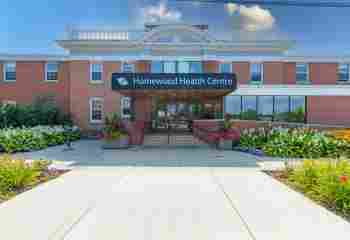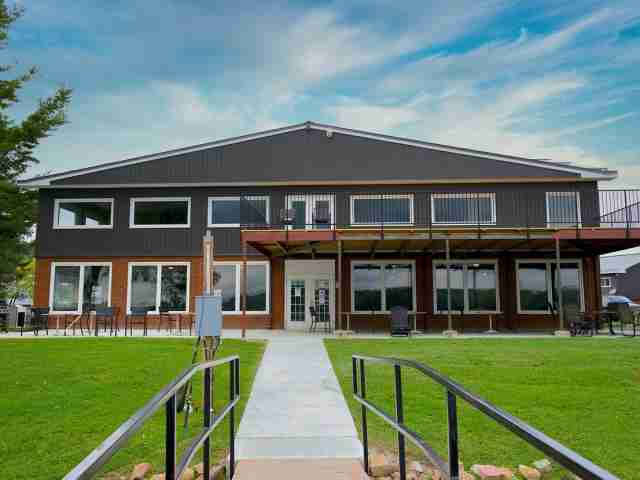More About Inpatient Rehab Programs
What Are Inpatient Rehab Centres Like?
You may be wondering what to expect in inpatient rehab. Inpatient, live-in or residential drug and alcohol rehab centres provide medical and therapeutic care around-the-clock. People entering inpatient treatment facilities receive highly individualized care from a multidisciplinary team of specialists.
People also live at the facility while participating in treatment-related activities, such as group meetings and individual counseling sessions. Some rehab centres provide medication as a part of treatment, as well as any other medical care required during the process. Programs may benefit those with prior history of substance abuse or co-occurring disorders (having a substance use disorder and a mental health condition at the same time).
How to Find an Inpatient Rehab Near Me
Whether you are suffering from an addiction to marijuana, alcohol, cocaine, heroin, gambling or sex, recovery is possible. You may be wondering, ‘where can I find the best inpatient rehabilitation centre near me?’ If you or a loved one is ready to enter treatment for drug or alcohol addiction or misuse, it’s important to carefully consider the various types of treatment available at each clinic to ensure that your needs are met.
Effective treatment is that which is tailored to your individual needs, whether it’s short-term or long-term, inpatient or outpatient.2 Here are some important points for you to consider before choosing an inpatient substance abuse rehab centre:
- Type of treatment: What type of inpatient treatment you need based on the level of care needed as assessed by your doctor or treatment professionals. Program lengths vary; you may choose a 28- or 30-day, 60-day or 90-day program.
- Substances treated: Find out whether the inpatient rehab centre treats the specific substance being used.
- Cost: Consider the cost of inpatient rehab centres and how you’ll pay for it (insurance, scholarships, financing). Inpatient rehabs are typically more expensive than outpatient, but they also provide various key levels of care and medical support.
- Certifications and credentials: Check what the credentials of the staff are.
- Facility mission and philosophy: Look at the drug rehabilitation facility’s philosophy and decide if it’s what you’re looking for (12-Step, evidence-based, faith-based) and aligns with your own personal beliefs and needs.
- Aftercare: Make sure they offer relapse prevention and aftercare planning, which may be helpful in maintaining sobriety after you leave treatment.
- Personal health and wellbeing: Consider your individual needs when choosing a drug and alcohol abuse treatment centre, including mental and physical health needs.
- Location: Consider the inpatient alcohol and drug rehabilitation centre’s location and if you prefer to enter treatment in a new environment or one closer to home.
- Amenities: Inpatient rehabs offer various amenities depending on the facility and individual needs. These can vary from basic to luxury amenities.
Are you or a loved one considering going to a live-in drug or alcohol recovery facility? You may be wondering, ‘where can I find inpatient rehab facilities near me?’ or ‘where can I find the best alcohol and drug rehab near me?’ Use our rehab search tool to find treatment near you.
How Long Are Inpatient Rehab Programs?
The length of inpatient treatment often ranges from short-term 28 day stays to more long-term 90-day stays, although this varies depending on the individual’s needs and can be much longer.
30-Day Alcohol and Drug Rehabs
30-day inpatient rehab programs give you enough time to get through the alcohol and drug detox process, learn about your addiction and participate in substance abuse therapy. These short-term rehab programs tend to be less expensive than longer stays since they’re shorter in length of stay and are more likely to be covered by insurance. Learn more about 30-day inpatient treatment programs.
60-Day Alcohol and Drug Rehabs
60-day inpatient substance abuse treatment programs give you more time to work through your addiction and establish a sober lifestyle and support network. You may spend much of the first 30 days in treatment moving through detox and drug or alcohol withdrawal, depending on the substance. Learn more about 60-day inpatient rehab programs.
90-Day Alcohol and Drug Rehabs
90-day inpatient drug rehab programs are recommended for people struggling with acute addictions and/or long-term drug or alcohol use. Remaining in treatment, whether inpatient or outpatient, is associated with remaining sober after leaving.2 Learn more about 90-day inpatient alcohol or drug rehab programs.
Additional Types of Inpatient Addiction Treatment Programs
Luxury Residential Programs
Luxury and executive programs cater to professionals, corporate executives, business owners or celebrities and tend to cost more due to the amenities they offer. Learn more about the luxury, private and executive residential rehab facilities that may be good treatment options if you are a working professional.
Hospitalization Programs
Hospitalization programs provide you with comprehensive medical care during detoxification. Once you’re stabilized out of hospital, you transition to a less restrictive treatment setting, such as a residential substance abuse treatment program or an intensive outpatient program. Hospitalization through an inpatient rehabilitation facility is generally only considered for people presenting with:3
- Severe withdrawal symptoms, particularly those that are complicated by the use of multiple drugs or if the person has a history of delirium tremens (a withdrawal condition characterized by tremors, anxiety, disorientation and hallucinations).
- Severe overdose and significant respiratory depression or coma.
- Acute or chronic medical condition(s) that are likely to complicate the person’s withdrawal from substances.
- A marked co-occurring psychiatric condition placing the person at risk of hurting themselves or someone else.
- Acute substance dependence with a significant history of nonresponse to trials of other less intensive treatment programs.
Advantages of Inpatient Rehab Facilities for Addiction Treatment
Inpatient alcohol and drug rehab facilities with flexible or extendable program lengths are preferable for some because they allow you to work at your own pace toward addiction recovery. You may finish a 30-day inpatient rehab program and realize that you need more time in the clinic to work on relapse prevention or sober living skills, for example.
People admitted to inpatient treatment centres receive constant medical care from a multidisciplinary team of specialists. This is particularly important if you have significant and longstanding histories of addiction and abuse. You will generally require more comprehensive medical care during the alcohol and drug detoxification process, which includes medical management of other acute medical or psychiatric conditions.
Inpatient and residential treatment centres provide a distraction-free environment so that you’re able to focus on your path to recovery. This can be the key to success in treatment for substance abuse, as it allows you to be removed from any triggers to using while you learn to function without substances.
Given that inpatient treatment programs provide 24-hour care, these programs are ideal for helping you with a more severe and long-standing addiction. Having around-the-clock support (including therapy or counseling and medical support) can help you focus on your recovery and get through the initial phase of treatment.
Questions to Ask About Inpatient Treatment Programs and Clinics
If you are wondering, ‘where can I find inpatient drug and alcohol rehab centres near me?’, here are some questions that are important to consider when exploring residential or inpatient rehab clinics for substance abuse treatment:
The most important consideration is whether the rehab centre has experience or specializes in treating your particular addiction. You may also want to ask about treatment options for managing co-occurring mental health problems, also known as dual diagnosis inpatient treatment, should that be necessary.
You may find that there is not an appropriate inpatient treatment program in your area. However, if there are inpatient recovery centres nearby, consider the pros and cons of being admitted to a local rehab centre versus traveling out of state (e.g. family may be able to visit more easily if you’re admitted to a local program).
You may wish to consider specific characteristics of the alcohol and drug treatment centre. For instance:
- What are the ages and genders of the people treated there?
- How long is the program (most are around a month long, but this may not be long enough)?
- Can you extend the length of the program if it’s not long enough?
- Are people in the program allowed to receive any visitors?
- What are the accommodations like (i.e. private versus shared rooms, access to phone, Internet, TV, gym, pool or other amenities)?
- Are the meals provided cafeteria-style or are gourmet options available?
The cost of inpatient rehab can vary widely from program to program and individual insurance plans will differ in terms of the coverage available for rehab programs. There are multiple ways to pay for rehab if you have no insurance, ranging from grants for rehab treatments to applying for Medicare or Medicaid.
You can also finance your recovery using credit cards, loans or savings, but be careful when it comes to choosing how you are going to pay for your care. You may be able to access low-cost or free rehab treatment as well as state-funded rehabilitation programs. The Substance Abuse and Mental Health Services Administration (SAMHSA) is an excellent source for learning about financial options for paying for recovery and treatment, as well as providing information on rehab options with no insurance.
When searching for appropriate drug or alcohol abuse treatment centres, it is important to identify an accredited program and to make sure that they are run by professionals who are licensed and specially trained in treating addiction.
Detoxification is an important first step to successful treatment for substance abuse and addiction. Specialists will treat the immediate physiological effects of stopping substance use and removing toxins from the body. You may be wondering, ‘can I find an inpatient detox centre near me?’ or ‘where can I find the best detox centres near me?’
Most inpatient and residential substance abuse programs offer medically supervised detoxification that safely and systematically withdraws you from the substance or substances of abuse. However, it is important to ask whether a particular program offers specialized detox treatment.
Consider the philosophy of the potential recovery program. For instance, does the treatment model offer a religious focus or does it follow a 12-Step program? Are there evidence-based treatments offered?
Most inpatient drug treatment centres provide highly specialized and individualized treatment plans. These plans include medical management provided by a multidisciplinary team of specialists. You may want to ask about the specialists available on the staff of a particular treatment program.
Follow-up care and relapse prevention are critical components of successful substance abuse rehab programs. Follow-up care may include transitioning to an outpatient substance abuse program, sober living environment, support groups, therapy or other follow-up meetings.
The rate of relapse following treatment for drug abuse can be as high as 50%. Therefore, the most successful programs are those that include relapse prevention as part of their treatment plan.































